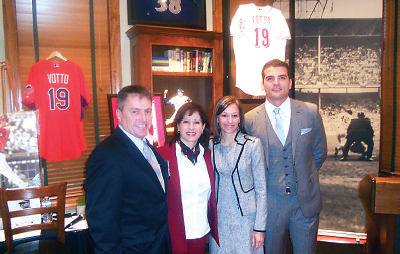Athlete Works to Bring Psychiatric Care to Veterans and Their Families
Abstract
An athlete’s experience with mental illness leads him to launch a foundation to help service members and veterans who have PTSD and their families.

Until recently, Cincinnati Reds first basemen Joey Votto (far right) was known for his skills on the baseball field. Now the hope is that his name will be linked to the recovery of service members seeking help for PTSD. University of Cincinnati’s Kate Chard, Ph.D. (second from left), joined Votto to announce that the Joey Votto Foundation would be serving veterans seeking help for PTSD and their family members. With them are Michael Newcombe, a Canadian military veteran, and Jill Miller, executive director of the foundation.
Speaking of his experiences with depression and anxiety, Cincinnati Reds first baseman Joey Votto announced last December the creation of the Joey Votto Foundation, a nonprofit 501(c)(3) organization established to provide evidence-based treatment for U.S. service members, veterans, and military families dealing with posttraumatic stress disorder (PTSD).
“Although neither I nor anyone in my family has served [in the military],” he said in a press conference, “I do know what it feels like to suffer from panic attacks, depression, and emotional struggles after a life-changing event.” Votto went on to say that the death of his father in 2008—which happened during Votto’s second year in the major leagues—led to overwhelming panic attacks and bouts of depression that landed Votto on his team’s disabled list due to stress the following season.
Said Votto, “I’ve combined my personal perspective on the healing power of clinical professionals with my appreciation for the deserving military heroes who need similar help. As a result, my off-the-field focus these days is on fighting for the cause of veterans and service members who need help healing their nonphysical wounds.”
Veterans are receiving treatment through the Joey Votto Military Family Stress Disorders Program at the University of Cincinnati, and the goal is to treat 500 active-duty service members, veterans, or family members on an annual basis, regardless of their ability to pay. The foundation’s operating budget for 2014 is approximately $490,000.
According to Kate Chard, Ph.D., who is director of the Joey Votto Military Family Stress Disorders Program and a professor of psychiatry and behavioral neuroscience at the University of Cincinnati, “evidence-based treatments for PTSD are effective, but making them available to the community at large has been our biggest obstacle,” she told Psychiatric News.
Chard, who will provide treatment to the veterans as part of the program, also said “over 70 percent of patients who receive evidence-based treatment do not have a diagnosis of PTSD within seven to 15 sessions later.”
She noted that some veterans may be ineligible to receive mental health services through the Veterans Administration (VA) due to a dishonorable discharge status incurred from substance use during their time in the military, and she expects that the Joey Votto Foundation will be able to assist these and others who would be deemed ineligible for care. “Substance use is often one way to cope with the symptoms of PTSD,” she noted. Some members of the military may be afraid to seek help through the VA due to stigma as well.
The Joey Votto Foundation will also be able to provide treatment to family members of service members and veterans. “PTSD in combat veterans causes a very difficult circumstances for the home life,” Chard noted. “We have seen higher rates of divorce, domestic violence, and truancy and delinquency in children and adolescents.” It is often necessary in these cases to bring the entire family in for therapy, Chard said, to begin to address such issues with evidence-based couples therapy and parent-training.
While the program is based at the University of Cincinnati, it is expected that veterans and service members in Indiana, Kentucky, and Ohio will make use of the program’s benefits. A veteran outreach coordinator will be the first point of contact for veterans and their families who are interested in receiving services through the foundation and will link them to the foundation clinicians, including psychiatrists, psychologists, and social workers.
The Joey Votto Foundation will also link veterans to the community through volunteer projects, according to the foundation’s executive director Jill Miller, “to connect them with one another, to something bigger than themselves, and to give them a strong sense of purpose,” she told Psychiatric News.
More information about the Joey Votto Foundation can be accessed here.



